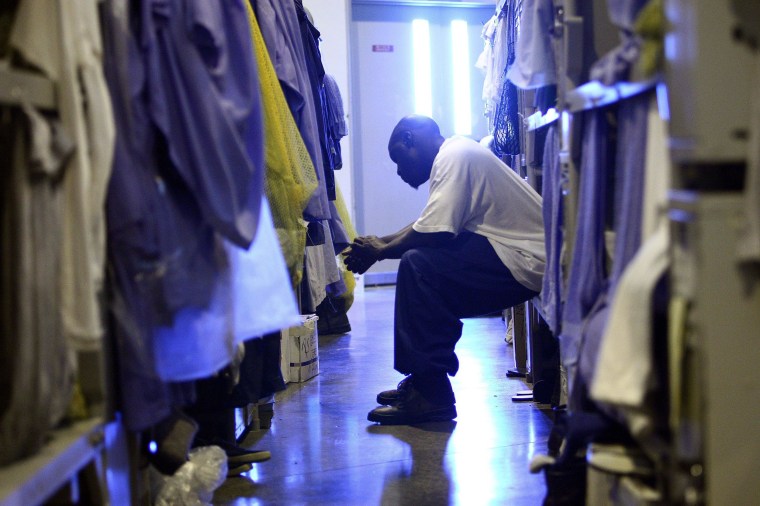In President Barack Obama's visit to El Reno Federal Prison in El Reno, Oklahoma last week, heroic allegory abound. He waded throughout El Reno's emptied cell block B; he bore witness to the isolation imposed by its cramped quarters—the coldness of its air—the eeriness of its quiet. He remarked how fortunate he was for such confines to have remained so foreign to him for so long. He sat and spoke to the prison's inhabitants in a profound linkage of the White House and the “big house”—the country's presiding officer and those imprisoned by the law and order of his great nation.
President Barack Obama entered El Reno Federal Prison having thrown the weight of his aspiration behind criminal justice reform, but given the invisibility of prisoners, and the dearth of our consideration for them, it is difficult to determine whether—after his visit—prisoners in El Reno and beyond ought to feel inspired or apathetic about the future ahead.
RELATED: Criminal Justice Reform: The Sleeper Issue of 2016?
President Obama's visit was, in the sincerest employment of hyperbole, un-presidential. No sitting president before Barack Obama had entered a federal prison, much less donning traditional presidential regalia: pleated pants, an authoritative gaze, and the cloak of an exceptional country. But Barack Obama entered El Reno Federal Prison Thursday both blessed and cursed with it all.
He entered as President: Powerful, mighty, and entrusted with the highest title in the land.
He entered as populist: Powerful, mighty, and expected to use those attributes toward the betterment of his audience.
But the promise of criminal justice reform has always been elusive. Recent studies and polls suggest more Americans are becoming comfortable with saying they welcome reforms to the criminal justice system, with many placing heavy emphasis on drug treatment programs and mental health facilities as alternatives to imprisonment. It is quite possible that—with time—every American in the country will comfortably say as much.
To express such sentiment allows us some sort of adherence to the principles of freedom and equity we claim to hold dear. The passive support for criminal justice reform is mere symbolism at best and, more cynically, a ruse at worst; claiming commitment to “criminal justice reform” allows a country to machinate without guilt. A country committed to reformation in its criminal justice system does not allow its multi-billion dollar carceral estates to operate with impunity (many times over); it does not seek to reform its prison system—its prisoners, even—without pledging to reform those who so frequently send its citizens into isolation, or to an early death.

Accomplishing these feats does not require sympathy, but instead, introspection. To induce prison reform does not so much require that we see prisoners as victims as it requires we see ourselves as perpetrators.
In a July 14th speech before the national chapter of the NAACP, President Barack Obama indicted the persistence of bigotry in the American criminal justice system and predicted a turning point in our dialogue concerning race and justice, stating:
“In recent years, the eyes of more Americans have been opened to this truth, partly because of cameras, partly because of tragedy, partly because the statistics cannot be ignored. We can't close our eyes anymore.”
To uncomfortably deploy the phrase which propelled him to office, “Yes, we can.”
Presently, disparate sentencing is not without its critics; indeed, they are plenty. But we are naïve to believe we are primed to change old habits simply because they are inhumane and costly. Pundits and politicians of the past also criticized disparate sentencing and imprisonment, yet the problem persisted and worsened with time.
When the Violent Crime Control and Law Enforcement Act of 1994 was all but guaranteed passage, former Senator Russell Feingold (D-WI) stood before the Senate to criticize the law for its inevitable racial biases. Among Feingold’s many objections, he felt the law was especially stringent toward drug offenders (many of whom were concentrated in cities following the crack epidemic), giving them prolonged prison sentences for low-level offenses. It was prior to his sole Democratic vote against the bill (a bill lauded by Democratic President Bill Clinton and a near-totality of his party peers in Congress) when Feingold offered his prophecy:
“There is much in [this bill] that has merit, and I was encouraged to see Senator Biden pledge his support during the conference deliberations that he would hold hearings on the issue of racial bias in the implementation of the death penalty and the criminal justice system as a whole...[A]t this point, Mr. President, I would like to conclude by saying that because of the absurd extension of the death penalty with no real gain coming from it, and because of the greatly increased dangerous trend for federalization of law enforcement, I feel compelled to vote against the [legislation].”
Senator Feingold's testimony was sandwiched between two proponents of “tough sentencing,” Senators Denton Darrington (R-ID) and David Pryor (D-AR). The bill passed, and twenty years removed, its signatory, Bill Clinton, offered remorse to the Black families he disrupted.
The persistent disproportion in crime sentencing and imprisonment is a clear reflection of national sentiment—a suggestion that Blackness often denotes a violence and criminality worthy of bondage. This is a powerful, weighty ideology which has endured through time despite its inefficiency and disregard for the bodies it destroys.
President Barack Obama knows this. He, alone, cannot save us. He, alone, cannot save the prisoners with whom he spoke Thursday. To understand that reality is to admire the beauty and history of his visit, yet acknowledge the tragedy in it all.
